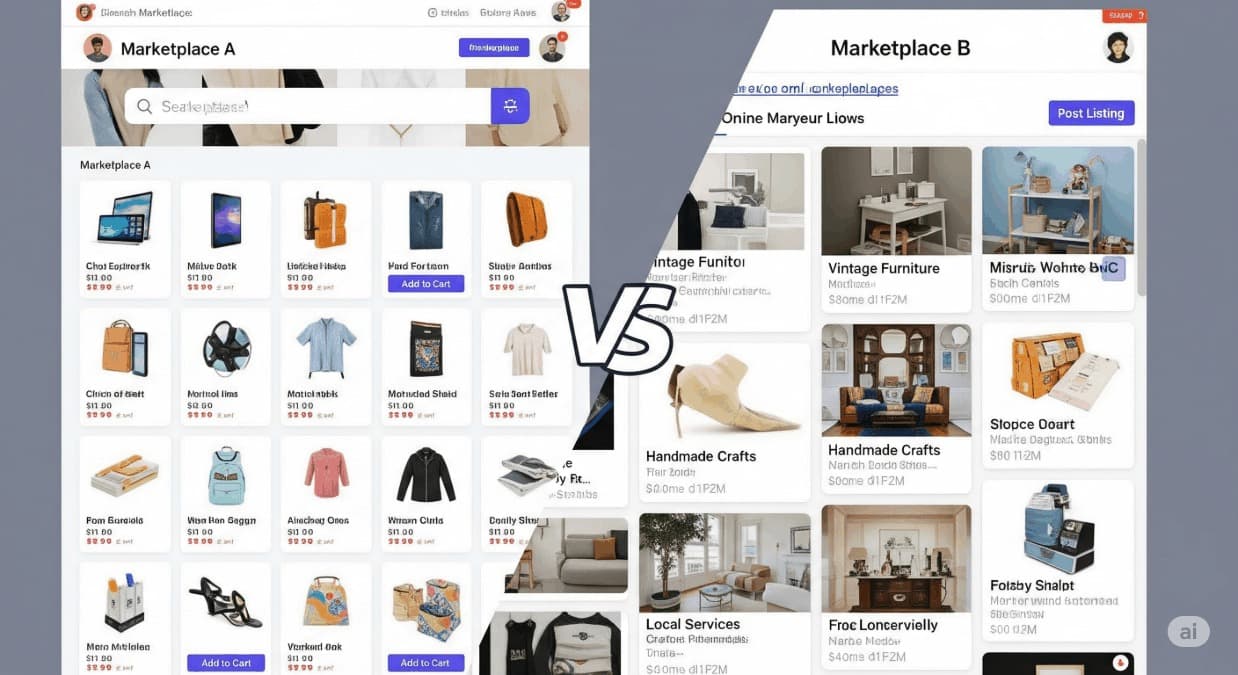Choosing Your E-Commerce Destination: A Comparison of Marketplaces

The digital landscape has revolutionized the way we shop. Forget crowded malls and long queues; today, a vast array of products is just a few clicks away, thanks to online marketplaces. These platforms act as virtual shopping centers, bringing together countless sellers and millions of buyers. However, for beginners venturing into the world of online shopping, the sheer number of options can be overwhelming. Understanding the nuances of each platform is crucial for a smooth and satisfying shopping experience. This article provides a comprehensive comparison of marketplaces to help you navigate this exciting digital frontier.
Understanding Online Marketplaces
Before diving into specific platforms, it’s essential to grasp the fundamental concept of an online marketplace. Essentially, it’s a website or app where multiple third-party sellers can list and sell their products or services. The marketplace owner provides the platform, infrastructure, and often various tools to facilitate transactions. This model offers numerous benefits for both buyers and sellers, including a wide selection of goods, competitive pricing, and convenient shopping experiences.
Key Factors to Consider in a Marketplace Comparison
When undertaking a comparison of marketplaces, several key factors come into play. These include:
- Product Selection and Variety: Does the marketplace offer the types of products you’re interested in? What is the breadth and depth of their inventory?
- Pricing and Value: How competitive are the prices? Are there frequent sales or discounts? Consider the overall value proposition.
- Shipping and Delivery Options: What are the shipping costs and estimated delivery times? Are there reliable tracking options?
- Return and Refund Policies: How easy is it to return an item if you’re not satisfied? What are the terms of the refund policy?
- Customer Support: How accessible and helpful is the customer service team? Are there multiple channels for support (e.g., email, phone, chat)?
- User Interface and Experience: Is the website or app easy to navigate? Is the search functionality efficient?
- Security and Trust: Does the marketplace have secure payment processing? Are there measures in place to protect buyers from fraudulent sellers?
- Seller Reputation and Reviews: Are sellers rated and reviewed by previous customers? This can provide valuable insights into the seller’s reliability.
A Closer Look at Popular Marketplaces
Let’s delve into a comparison of marketplaces, examining some of the most popular options available to online shoppers:
Amazon
Amazon is arguably the largest and most well-known online marketplace globally.
- Pros: Vast product selection, often competitive pricing, Prime membership offers fast and free shipping on many items, robust customer support, extensive buyer protection policies, user-friendly interface, and a well-established reputation.
- Cons: Can be overwhelming due to the sheer volume of products, some concerns about counterfeit goods, and the dominance of Amazon’s own private-label brands.
eBay
eBay operates on a slightly different model, primarily featuring auction-style listings alongside fixed-price items.
- Pros: Wide variety of new and used goods, potential for finding unique or rare items, often lower prices through bidding, and a strong emphasis on community and direct interaction with sellers.
- Cons: Shipping costs and policies can vary significantly between sellers, return policies are also seller-specific (though eBay offers some buyer protection), and the auction format might not appeal to all shoppers.
Etsy
Etsy focuses on handmade, vintage, and craft supplies.
- Pros: Unique and handcrafted items not typically found elsewhere, supports small businesses and individual creators, a strong sense of community, and a focus on personalized and artisanal goods.
- Cons: Prices can be higher compared to mass-produced items, shipping times and costs can vary depending on the seller’s location and production time, and return policies are set by individual sellers.
Walmart Marketplace
Walmart’s online marketplace has grown significantly, offering a wide range of products from both Walmart and third-party sellers.
- Pros: Competitive pricing, integration with Walmart’s physical stores for convenient pickup and returns, increasing product selection, and generally reliable shipping.
- Cons: Third-party seller policies might vary, customer support for third-party purchases might be separate from Walmart’s own, and the selection might not be as extensive as some other major marketplaces.
Target Plus
Similar to Walmart Marketplace, Target Plus is a curated selection of third-party sellers that complement Target’s existing product offerings.
- Pros: Focus on quality and curated selection, integration with Target’s website and app, potential for Target Circle rewards on some purchases, and generally reliable customer service.
- Cons: Smaller selection compared to larger marketplaces, and third-party seller policies may vary.
Making the Right Choice: A Final Marketplace Comparison
The best online marketplace for you depends on your individual needs and preferences. If you’re looking for the widest possible selection and fast shipping, Amazon might be your go-to. For unique finds and potential bargains, eBay could be worth exploring. If you appreciate handmade and vintage items, Etsy is a great choice. Walmart Marketplace and Target Plus offer convenience and integration with familiar retailers. This comparison of marketplaces highlights the distinct advantages of each platform.
Stay up to date with the latest news
Ultimately, the comparison of marketplaces reveals that no single platform is universally superior. Consider what you prioritize – price, selection, convenience, or unique items – and choose the marketplace that best aligns with your shopping goals. As a beginner, it might even be beneficial to try out a few different marketplaces to find the ones that you find most enjoyable and reliable. This ongoing comparison of marketplaces in your own experience will be the most valuable guide.
Share this content:






